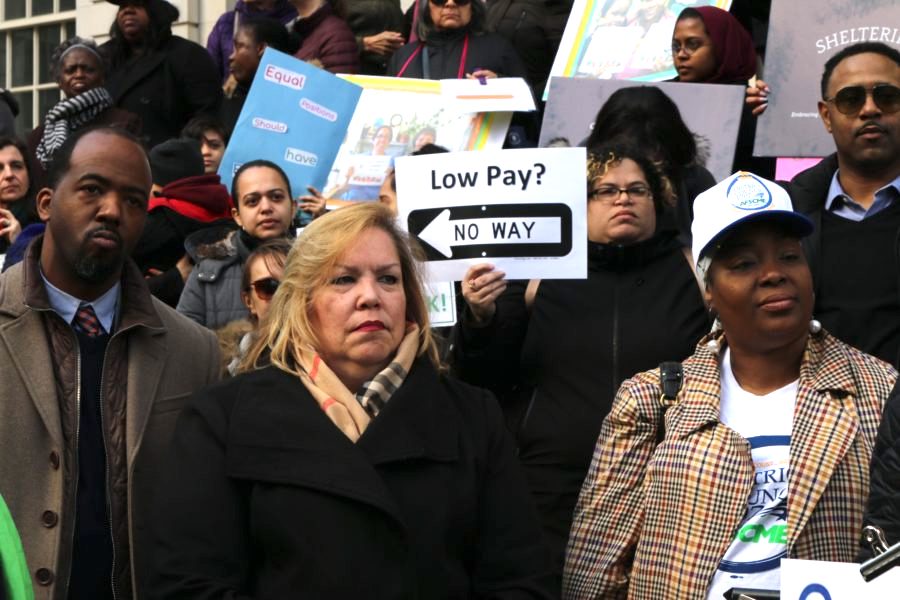With a potential strike looming, the first estimate for what it would cost to boost salaries for pre-K teachers who work in community centers has been put on the table: $438 million.
That’s what the Day Care Council of New York estimates it would cost over the next five years to bring pre-K teachers who work in community organizations on-par with their counterparts who work in public schools. The figure also includes an increase for center directors to make sure their pay keeps up at the same pace as the teachers they oversee.
It’s the first time an estimate has been made public and could be an opening salvo for negotiations. The Council represents nonprofit operators who rely mostly on city funding to run their programs.
“If you want a strong foundation for our youngest citizens in early education, you have to create a strong infrastructure,” said Andrea Anthony, head of the council. “And to have the professional staff to do that, and the support staff, you have to be willing to pay for it.”
The union, however, appeared ambivalent about the estimate, only commenting that that it does not include the cost to raise pay for all childcare workers.
“Parity should be inclusive of every category, from a certified teacher to a custodian,” District Council 1707 spokesman Jason Urgiles wrote in a text message.
Pre-K teachers who work in community organizations have threatened a single-day strike in May to demand higher pay, casting a harsh spotlight on Mayor Bill de Blasio’s signature political achievement at the same time he is considering a presidential bid.
The mayor has made free pre-K available for every 4-year-old in the city at breakneck speed, an accomplishment made possible by the very pre-K teachers now weighing a walk out. In order to serve so many children, the city relies on community organizations, which enroll almost 60 percent of the students in universal pre-K. The rest attend public schools.
Teachers employed in community centers have a starting salary around $42,000. Those employed by the education department, represented by the United Federation of Teachers, have salaries that start around $59,000. The yawning gap has made it a struggle to recruit and retain teachers, community operators say.
The Day Care Council’s figure includes boosting pay only for certified teachers, which they estimate make up about 3,000 educators, or about half of those in the classroom. (Teachers can begin working at a community organization without certification while they earn their credentials, and operators say many of their teachers are on study plans because those with certification leave for the higher salaries offered at public schools.)
Also included in the estimate is a pay boost for center directors so those employees will continue to earn about 23 percent more than teachers, and an annual compounded 2.8 percent cost of living increase.
But these raises would not keep teachers totally on pace with the United Federation of Teachers, whose members are eligible for longevity pay that are not factored into the Council’s cost estimate.
Operators, teachers, and advocates say the time is ripe to move towards salary parity: The city has just released its latest round of contracts for early childhood education services, which providers are getting ready to bid on as part of a massive overhaul of how the city oversees care for its youngest residents. Advocates say now is the time to build additional funding into those contracts. The city is also in the midst of negotiating its budget, with the city council expected to soon unveil its response to the mayor’s proposals.
The city is projected to spend almost $900 million on universal pre-K next year, and the council’s estimate would add $83 million to that figure. Councilman Mark Treyger, head of the education committee, called the number “doable” and “reasonable” despite the fact that de Blasio has called for cuts amid anticipated reductions in income tax collections.
“We have to get this right,” he said. “We cannot hold onto quality educators because of this parity problem, and it has a destabilizing effect for the instruction of children.”
The union has indicated it wants to see a bigger investment in its workforce. While DC 1707 has pushed for a salary increase for support staff as well — custodians, cooks, bookkeepers and the like — the council recommends putting that off until the next round of contract negotiations. The council also leaves assistant teachers out of the calculation.
It’s unclear how far the mayor might be willing to go in the negotiations, but in a Medium post published Friday afternoon, city spokeswoman Jaclyn Rothenberg suggested the city is weighing the potential for raises.
“We agree that we must do better and improve the overall parity, since we want those community organizations to continue to grow and be able to provide support for two-year-olds and one-year-olds too,” she wrote. “There’s still more work to be done and we’re engaging them in that conversation.”

